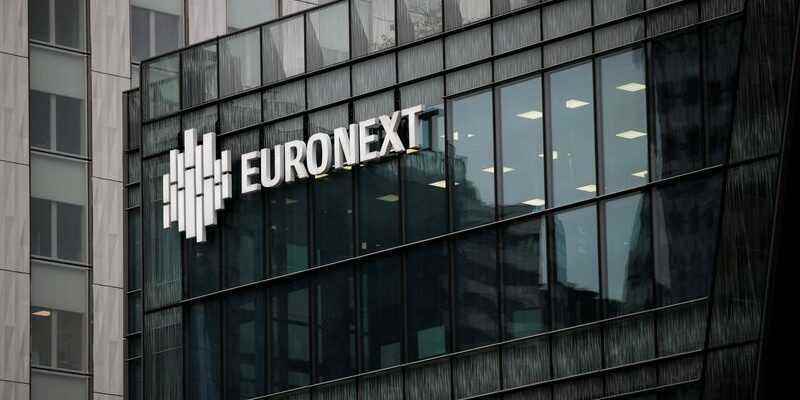by Claude Chendjou
PARIS (Reuters) – European stocks ended higher on Thursday and Wall Street was also in the green mid-session, as renewed optimism in equity markets was fueled by the prospect of a less drastic rate hike. of interest in the face of the risk of a recession and by stimulus measures in China.
In Paris, the CAC 40 ended with a gain of 1.6% to 6,006.7 points. The British Footsie advanced 1.3% and the German Dax 1.97%.
The EuroStoxx 50 index gained 1.95%, the FTSEurofirst 300 1.87% and the Stoxx 600 1.88%.
Although the US Federal Reserve (Fed) and the European Central Bank (ECB) have reaffirmed in the minutes of their last respective monetary policy meetings their desire to tackle inflation, some investors believe that they could be less aggressive on interest rates in the coming months due to the risk of a deterioration in the economy.
After the publication of the ECB’s “minutes”, the money markets were only expecting a total increase of 135 basis points in rates by the end of the year in the euro zone, i.e. 30 points less than these last weeks.
Regarding the Fed, Dennis Dick, trader at Bright Trading, said: “If the inflation data out next week is encouraging, a 50 basis point hike is possible (…) It is a good thing, knowing that we were talking about an increase of 75 (basis points) and that some members of the Fed were even going up to 100 points.
US consumer price data will be out next Wednesday and, pending Friday’s jobs report, weekly jobless claims released on Thursday showed a stronger-than-expected rise last week, to 235,000. .
Another element of support for the equity markets, the Chinese Ministry of Finance plans, according to the Bloomberg agency, to authorize local authorities to issue 1,500 billion yuan (219.4 billion euros) of bonds in the second half of the year, which would make it possible to accelerate the financing of infrastructures aimed at strengthening the world’s second-largest economy.
VALUES
On the pan-European Stoxx 600, the basic resources compartment (+5.43%) posted the best sector performance, followed by automotive (+5.29%) and energy (+4.09%) , due to their exposure to China where a recovery plan seems to be in preparation.
Mining stocks like Glencore, Anglo American, Thyssenkrup and ArcelorMittal gained from 5.74% to 7.25%. In the automotive sector, Renault, Stellantis and Volkswagen rose from 5.24% to 6.94%, while in energy, TotalEnergies, BP and Eni advanced by 3.64%, 4.50% and 3, respectively. 11%. Luxury groups like LVMH (+1.67%) and Kering (+3.22%) were also sought after.
In semiconductors, Infineon (+3.38%), STMicroelectronics (+2.84%) and ASML (+4.39%) were supported by results from Samsung, the South Korean group having published its best profit over the April-June period since 2018.
On the downside, airline SAS plunged 11.38% after it announced on Thursday that hundreds of flights were canceled in the face of a pilots’ strike, while British property developer Persimmon fell 4.96% in reaction to lower-than-expected home deliveries in the first half.
AT WALL STREET
At the time of the close in Europe, the Dow Jones was up 0.84%, the Standard & Poor’s 500 1.17% and the Nasdaq 1.78%, with the indices appearing to have found stability since the start of the month after a sharp fall in the first half linked to fears of an acceleration in the rise in the cost of credit which could lead to a recession.
In values, chipmakers are sought after in the wake of strong results from Samsung: Intel, Nvidia and Qualcomm gain 2.66%, 3.82% and 4.50% respectively, while their sector index advances by 3.7 %.
CHANGES
On the foreign exchange market, the euro, at a 20-year low against the dollar, is approaching a little closer to parity with the greenback, losing 0.17% to 1.0164 dollar, due to concerns over the growth in the euro area. Analysts also believe that the ECB has only costly solutions against the weakness of the European currency.
The dollar, which touched this week a peak since the end of 2002 against a basket of currencies of reference, is almost stable in expectation of the monthly report on employment on Friday.
The pound rose 0.64% to 1.1997 dollars after the announcement of the resignation of Boris Johnson as Prime Minister of Great Britain.
“One of the reasons why the pound is not doing too badly is the feeling that a new Conservative government and a new Chancellor of the Exchequer will accelerate fiscal easing,” said Ray Attrill, at National Australia Bank, adding that the Bank of England’s dovish rhetoric also helps.
RATE
Bond yields in Europe rebounded: that of the ten-year German Bund ended up eight basis points at 1.288% after gaining up to 13 points in session.
The ten-year French OAT rate also gained about eight points to 1.849%.
The yield differential (spread) between ten-year Italian bonds and those of Germany of the same maturity contracted to 206 basis points, François Villeroy de Galhau, one of the members of the Board of Governors of the ECB, having declared that there was “no doubt” about the launch of the future anti-fragmentation tool supposed to prevent an excessive widening of the spreads between the debts of the countries of the euro zone.
In the United States, the yield on ten-year Treasuries stands at 2.989%, also up nearly eight points, but it had reached 3.498% on June 14, its highest level since April 2011.
OIL
The oil market, which had suffered in previous sessions, is once again supported by tensions on supply which outweigh fears of a drop in demand.
The barrel of Brent gained 5.37% to 106.1 dollars and that of American light crude (West Texas Intermediate, WTI) 5.75% to 104.2 dollars.
(Written by Claude Chendjou, edited by Bertrand Boucey)
Copyright © 2022 Thomson Reuters
